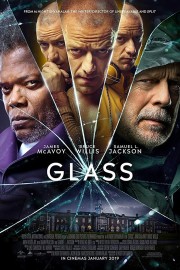Glass
There are waves of thoughts that have come up after watching “Glass,” the final film of M. Night Shyamalan’s “Eastrail 177” trilogy, and one of them has to do with the using of that descriptor to identify the trilogy rather than “Unbreakable,” the 2000 film that introduced us to Shyamalan’s superhero universe, or “Split,” the 2017 film that revealed itself to be a stealth sequel to that film. I’m going to try to avoid spoilers as much as possible here, but I make no promises. I will definitely deal more with spoilers in a later article on the trilogy as a whole.
“Glass” is going to polarize fans in a way that we thought we were done with in regards to Shyamalan after films like “Lady in the Water” and “The Happening,” but in this case, it’s going to be more of an issue of deciding how successfully, or unsuccessfully, this film wraps up Shyamalan’s trilogy, and I can see it going either way. As for myself, I will likely have to see it again to really wrap my head around those things, and thankfully, that’s not an entirely unappealing prospect.
The film takes place three weeks after the events of “Split,” where Kevin (who suffers from DID, and is played by the phenomenal James McAvoy) kidnapped three teenage girls, and his 23 different personalities manifested into a 24th known as “The Beast.” There was one survivor (Casey, played by Anya Taylor-Joy), whom Kevin, as The Beast, let go because like Kevin, she was a survivor of trauma as a child, and was, as such, “pure” in The Beast’s eye. Now, she has moved on, and is with a loving foster family, and Kevin has continued to kidnap groups of girls for The Beast. Now, however, he has someone on the lookout for him, though, in David Dunn (Bruce Willis), the security guard who was impervious to a train crash in “Unbreakable,” and now runs a home security business with his grown son, Joseph (played once again by Spencer Treat Clark), while moonlighting as the poncho-wearing vigilante protector of the innocent he was revealed as in “Unbreakable.” Soon enough, Kevin and David will find themselves face-to-face, in a psychiatric hospital, with a doctor (Ellie Staple, played by Sarah Paulson) whom specializes in patients with delusions of grandeur as they liken themselves to be superheroes. They will not be alone, however; it is the same facility Elijah Price (Samuel L. Jackson), the terrorist whom blew up the train David was on in “Unbreakable,” and whom suffers from an extreme case of brittle bones, has been in for 19 years.
Once you see the movie, you can probably look back on the trailers that have been released for “Glass,” and realize that Shyamalan and the studios gave us clues as to this film’s endgame in what we see in them, and not just the obvious team-up by Elijah and The Beast. It ultimately justifies some of the choices Shyamalan made in the story, and some of the storytelling choices he made as a director, but I’m still not entirely sure how I feel about the place this film ends in. Especially when we get to the hospital, there are stretches of this film that are some of the best stretches of filmmaking and storytelling Shyamalan has come up with in his career, but the third act feels very predictable after how unpredictable the first two chapters of this trilogy were. I greatly admire the way Shyamalan is trying to build a traditional superhero universe within a grounded reality not unlike our own, but there are directions this particular story unfolds that reminded me of the overreaching and pretentious storytelling of the “Matrix” sequels in 2003. I wonder what type of story this might have been had Shyamalan been able to complete his trilogy sooner, although he does a solid job of earning the years-later franchise building he started to realize in “Split.” We will never know, but I think, for more reasons than one, we’ll be debating this trilogy of films long after “Glass” has made its way out of theatres, and people start to revisit it in conjunction with its predecessors.










